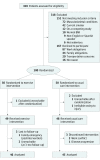Effect of Aerobic and Resistance Exercise Intervention on Cardiovascular Disease Risk in Women With Early-Stage Breast Cancer: A Randomized Clinical Trial
- PMID: 30920602
- PMCID: PMC6512455
- DOI: 10.1001/jamaoncol.2019.0038
Effect of Aerobic and Resistance Exercise Intervention on Cardiovascular Disease Risk in Women With Early-Stage Breast Cancer: A Randomized Clinical Trial
Abstract
Importance: The Framingham Risk Score (FRS) is a valid method for predicting the 10-year risk of developing cardiovascular disease. Higher FRS is reported in patients with early-stage breast cancer who are overweight than in healthy, age-matched women, but whether exercise reduces FRS in this patient population is unclear.
Objective: To examine the effects of a 16-week aerobic and resistance exercise intervention on the FRS in women with early-stage breast cancer and with overweight condition or obesity.
Design, setting, and participants: This single-center, prospective randomized clinical trial included 100 women with stage I to III breast cancer who were sedentary, with overweight condition or obesity (body mass index of ≥25.0 or body fat of ≥30%), and completed cancer treatment within 6 months prior to enrollment. Participants were randomized to either the usual care or exercise group. Differences in mean changes for outcomes were evaluated using mixed-model repeated-measures analyses. Data were collected from August 1, 2012, through July 1, 2017. Data analysis, which followed the intention-to-treat approach, was performed from May 24 to October 2, 2018.
Interventions: The exercise group underwent supervised aerobic and resistance exercise sessions thrice weekly for 16 weeks.
Main outcomes and measures: The FRS was calculated for each participant using preset points for each of the 6 FRS categories: age, systolic blood pressure, high-density lipoprotein cholesterol, low-density lipoprotein cholesterol, diabetes presence, and smoking status.
Results: In total, 100 women were randomized to either the exercise group (n = 50) or usual care group (n = 50). Of these women, 55 (55%) were of Hispanic white race/ethnicity and the mean (SD) age was 53.5 (10.4) years. The mean (SD) total FRS scores postintervention were 2.0 (1.5) in the exercise group and 13.0 (3.0) in the usual care group. The postintervention FRS was significantly reduced in the exercise group compared with the usual care group (mean, -9.5; 95% CI, -13.0 to -6.0), which corresponds to an 11% (95% CI, -15.0 to -5.0) decrease on the FRS-predicted 10-year risk of developing cardiovascular disease.
Conclusions and relevance: A 16-week supervised aerobic and resistance exercise intervention appeared to reduce the FRS-predicted 10-year risk of cardiovascular disease in women with early-stage breast cancer with overweight condition or obesity.
Clinical trial registration: ClinicalTrials.gov identifier: NCT01140282.
Conflict of interest statement
Figures
References
-
- Barroso LC, Muro EC, Herrera ND, Ochoa GF, Hueros JI, Buitrago F. Performance of the Framingham and SCORE cardiovascular risk prediction functions in a non-diabetic population of a Spanish health care centre: a validation study. Scand J Prim Health Care. 2010;28(4):242-248. doi:10.3109/02813432.2010.518407 - DOI - PMC - PubMed


